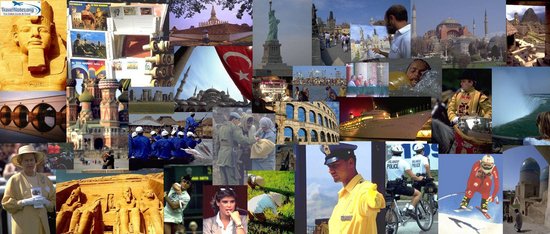Travel Notes: Africa - Western Sahara Travel Notes.
Short URL: https://tnot.es/EH
Western Sahara on Travel Notes
Adventures and Berbers - Exploring The Western Sahara Desert
Visit the heart of the Sahara desert on a thrilling desert safari. Explore majestic dunes, camp under the stars, and immerse yourself in the rich Berber culture. Share on Facebook
About Western Sahara
Spanish Sahara, was partitioned between Mauritania and Morocco in 1976, and since 1979 has been occupied by Morocco.
Visitors to Western Sahara can travel freely in most Moroccan-controlled parts of the country, but should still check the latest travel and safety advice.
Countries neighbouring Western Sahara: Mauritania, Algeria and Morocco.
 Add a Business -
Add a Location -
Add a Lodging - Add Travel Content
- Add URL
- Travel Services.
Add a Business -
Add a Location -
Add a Lodging - Add Travel Content
- Add URL
- Travel Services.
Mapping Western Sahara
Map of Western Sahara
Western Sahara remains a contentious and unresolved issue on the African continent.
It is one of the most sparsely populated regions in the world, characterised by vast desert landscapes.
The region (including much of Morocco and Mauritania) was 'controlled' by various nomadic tribes - modern notions of sovereign 'rule' came with European colonisers.
Western Sahara Overview
Western Sahara is a disputed territory located in North Africa, bordered by Morocco to the north, Algeria to the north-east, Mauritania to the east and south, and the Atlantic Ocean to the west.
There are ongoing efforts by the United Nations and other international actors to find a peaceful resolution to the conflict.
The Shifting Sands of Politics
Background and Conflict
Portuguese navigators visited the area near modern al-Aaiun, in 1434, but didn't establish lasting settlements.
The region was held by Spain in the early 16th century until Morocco took control and tried to rule over this part of the Sahara for more than three hundred years.
Spain came back into the picture in 1884, and established a protectorate over the coast from Cape Bojador to Cape Blanc.
Saharawi nationalists sought independence in the early 1970s, but Algeria, Mauritania, and Morocco, all laid claims to the area.
When King Hassan II of Morocco launched a massive non-violent invasion of Spanish Sahara in late 1975, Spain agreed to relinquish the area to Mauritania and Morocco.
Spain withdrew in February 1976, leaving two-thirds of the former Spanish Sahara occupied by Morocco and the rest by Mauritania.
Polisario guerrillas based in Algeria staged raids against Mauritanian and Moroccan outposts in Western Sahara between 1976 and 1978.
Mauritania surrendered its portion in 1979, only for Morocco to annex it all.
By February 1982, the Saharawi Arab Democratic Republic (SADR) was recognised by more than 70 nations and admitted to the Organisation of African Unity (OAU). Morocco suspended its OAU membership in 1985.
Ceasefire and UN Involvement
A ceasefire was declared in 1991, and the United Nations Mission for the Referendum in Western Sahara was established to oversee a referendum on self-determination for the Sahrawi people.
However, the referendum has not been held due to disagreements over who is eligible to vote.
Human Rights Concerns
The conflict in Western Sahara has resulted in human rights abuses, including forced disappearances, arbitrary arrests, and restrictions on freedom of speech and assembly.
Both Morocco and the Polisario Front have been criticised for their human rights records.
Natural Resources
Western Sahara is rich in phosphates, fisheries, and potentially offshore oil reserves.
The exploitation of these resources by Morocco has been a point of contention, with the Polisario Front and supporters arguing that the Sahrawi people have the right to control and benefit from these resources.
Political Status
Western Sahara is considered by the United Nations as a non-self-governing territory awaiting decolonisation.
The Sahrawi Arab Democratic Republic (SADR), recognised by over 80 UN member states, claims sovereignty over the entire territory, but only controls a small portion in the east; known as the Free Zone.
Major world powers have largely refrained from recognising SADR, and the political status of Western Sahara remains unresolved.
Population
The population of Western Sahara are mostly of Berber or Arab descent.
Western Sahara Today
Settlers from northern Morocco have been encouraged to migrate to Western Sahara through incentives offered to them by the Moroccan government.
The main towns of Western Sahara are al-Aaiun, or Laayoune - formerly the capital of Spanish Sahara - and Ad-Dakhla; formerly Villa Cisneros.
Laayoune
Map of Laayoune
Laayoune, the largest city in Western Sahara, serves as the administrative centre and has some tourist facilities.
While primarily a commercial hub, it offers some cultural attractions such as the Laayoune Museum, which showcases Sahrawi heritage and artefacts.
Where to Stay in Western Sahara
Hotel Al Massira

Hotel Al Massira: Avenue Mekka, El Aaiún.
Located in Laayoune, Hotel Al Massira features an outdoor swimming pool, a night club, and two restaurants.
Guests at the Hotel Al Massira enjoy free Wi-Fi in all areas and can take advantage of the tour desk, which offers trips and excursions.
Visiting Western Sahara
Tourism in Western Sahara is relatively limited due to the ongoing conflict and the harsh desert environment.
Travellers should exercise caution and be aware of the political situation when visiting Western Sahara.
However, the region does offer unique landscapes such as the vast desert expanses of the Sahara, including the Hamada du Draa and the Erg Chebbi dunes.
Additionally, the coastal areas along the Atlantic Ocean can be quite scenic.
Western Sahara Attractions
Birdwatching
The coastal areas of Western Sahara, particularly around Dakhla, are important for migratory birds.
Birdwatchers can spot a variety of species in the region, including flamingos, herons, and ospreys.
Cape Blanco
Situated on the Atlantic coast, Cape Blanco is a peninsula approximately 60km long, divided between Mauritania and Western Sahara.
It is is also known for being the westernmost point of the African continent.
Early European navigators referred to Cape Blanco as the 'point of no return' until it was successfully passed by the Portuguese navigator Capt. Gil Eanes in 1434.
Dakhla
Dakhla is a coastal city in Western Sahara, known for its watersports.
The area's strong winds and warm waters make it a popular destination for wind-surfing enthusiasts.
Dakhla is built on a peninsula that runs down from the mainland, creating a lagoon area that is popular for kite surfing and wildlife.
Dakhla is quite safe and a great beach destination.
Tulum Beach Resort Dakhla
Tulum Beach Resort Dakhla: Km 12 Plage Oum Labouir, Dakhla.
If you're looking for some luxury and serenity in Western Sahara, the Tulum Beach Resort Dakhla features villas, bungalows and cottages with private terraces and gardens, and a breathtaking view of the Ocean from your bed.
Historical Sites
While Western Sahara doesn't have as many ancient ruins as some other parts of North Africa, there are still archaeological sites worth visiting, such as the ancient town of Smara.
Lagouira
Lagouira, also known as La Gera or El Gouera, is located on the Atlantic coast at the southern tip of Western Sahara; on the western side of the Ras Nouadhibou peninsula, which is split in two by the Mauritania-Western Sahara border.
Local Cuisine
Western Saharan cuisine is a fascinating blend of African, Arab, and Berber influences.
Traditional dishes often include couscous, peanuts, barley, wheat, and locally sourced meats like camel and goat.
Phosphate Mines
Western Sahara is home to some of the world's largest phosphate reserves, and visiting the phosphate mines can provide insight into the territory's economic significance.
Sahara Desert
Western Sahara is predominantly a desert region, with vast stretches of sand dunes and rocky terrain.
The desert landscape itself is a major attraction for those interested in experiencing the solitude and beauty of the Sahara.
Exploring the desert on a camel is a classic activity in Western Sahara.
It allows visitors to experience the vastness and beauty of the Sahara Desert while immersing themselves in the local culture.
Sahrawi Culture
Visitors interested in learning about Sahrawi culture can engage with local communities and experience traditional music, dance, and cuisine.
Hospitality is an integral part of Sahrawi culture, and visitors may have the opportunity to stay in traditional nomadic tents called 'khaimas'.
Western Sahara Tours
Young Pioneer Tours
As a vast swath of barely inhabitable desert, you could be forgiven for wondering if there are any fun activities in Western Sahara or sights to see.
After running tours in the region for multiple years, Young Pioneer Tours have developed a list of the best things to do in Western Sahara.
Western Sahara Travel
Weather in Africa:
Local weather forecasts for destinations around Africa.
|
|
 Democratic
Republic of the Congo - Zaire Travel Notes.
Democratic
Republic of the Congo - Zaire Travel Notes.
More From Travel Notes
Travel Notes Online Guide to Travel
Africa - Asia - Caribbean - Europe - Middle East - North America - Oceania - South America.
The Travel Notes Online Guide to Travel helps visitors plan their trip with country and city travel guides, local tourist information, reviewed web sites, and inspiring travel content.
Travel and Tourism Guides on Travel Notes
 If you find Travel Notes useful, please take a moment to
like us on Facebook and share with your friends on social media.
If you find Travel Notes useful, please take a moment to
like us on Facebook and share with your friends on social media.
Share on Facebook
Travel Resources
.
Travel & Tourism With Industry Professionals.














